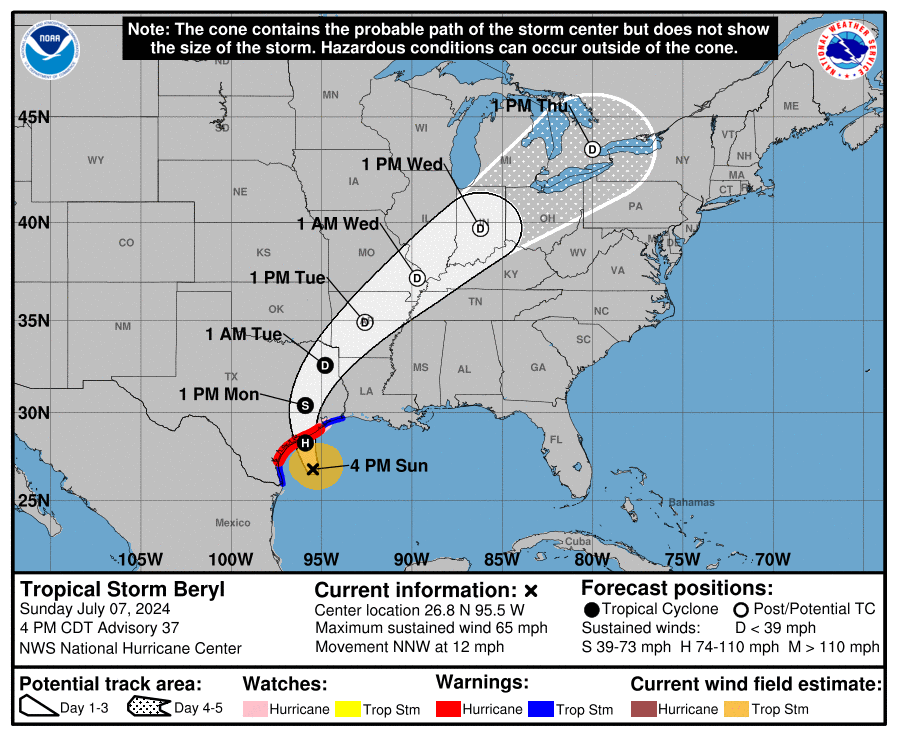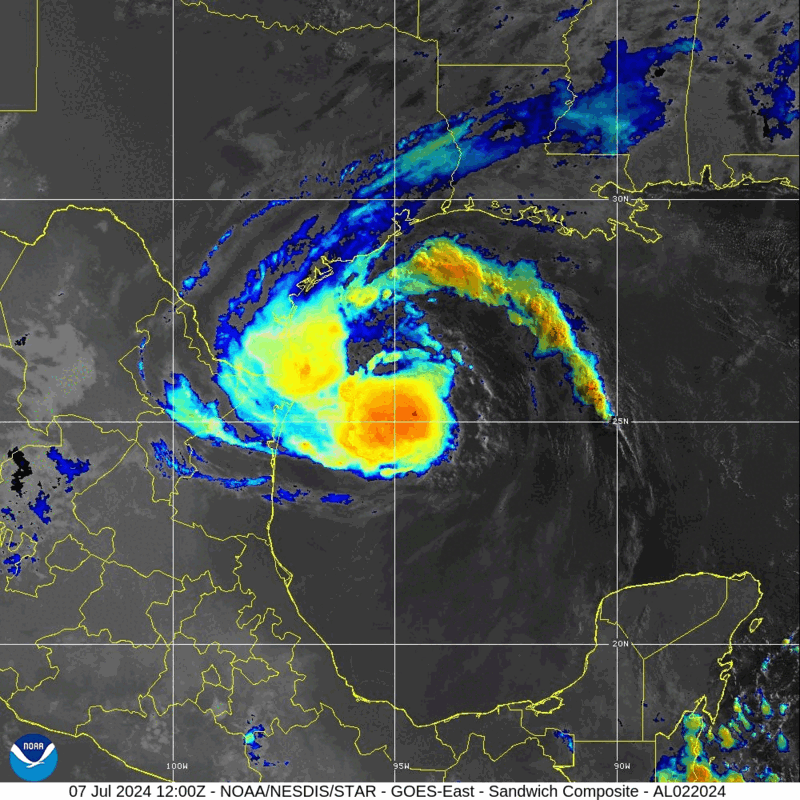Due to the effects from Tropical Storm Beryl to affect eastern Texas and the midwestern United States July 2024, you may want to consider delaying your travel — or, at least, keep yourself updated as to the latest information pertaining to the weather — if this region is in your travel plans over the next few days.
Tropical Storm Beryl to Affect Eastern Texas and Midwestern United States: July 2024 Travel Alert
Maximum sustained winds of Tropical Storm Beryl — which is currently approximately 130 miles south southeast of Matagorda in Texas and moving north northwest at a speed of twelve miles per hour — are at 65 miles per hour, which means that it is currently a strong tropical storm. Landfall of what is forecast to once again become a hurricane is expected to occur somewhere in the area of Matagorda Beach as soon as the early hours of tomorrow morning, Monday, July 8, 2024.

The outer bands of this tropical storm are already currently affecting southeastern Texas and western Louisiana with significant precipitation.
At least twelve fatalities have been reported since the first landfall of Hurricane Beryl occurred shortly after 11:00 in the morning Eastern Daylight Time on Monday, July 1, 2024 on Carriacou Island in Grenada in the Caribbean Sea, with maximum winds of 150 miles per hour. The second landfall occurred at approximately 6:00 in the morning Central Daylight Time yesterday, Thursday, July 4, 2024 northeast of Tulum in Mexico as a Category 2 hurricane with maximum winds of 110 miles per hour. Widespread substantial destruction has been reported in Grenada, Jamaica, and Saint Vincent and the Grenadines; and hundreds of people have been without electrical power.
Hurricane Beryl is the strongest known hurricane to pass through the Grenadine Islands, according to data from the National Oceanic and Atmospheric Administration of the Department of Commerce of the United States since records were first kept in 1851.
After emerging once again back out on the open warm waters of the Caribbean Sea, Hurricane Beryl strengthened to Category 5 status with sustained winds of 165 miles per hour. Fortunately, the speed of the forward motion of the storm has been between 15 miles per hour and 20 miles per hour, because a slower movement would have surely meant even more destruction in the path of the storm.
A hurricane to form as far east as Hurricane Beryl did — along with its intense strengthening — is unusual for this time of year. Hurricane Beryl is the earliest tropical storm system to achieve Category 4 strength in June; and it is the earliest tropical storm system to achieve Category 5 strength in July. This pattern normally starts to occur sometime in late July.
A Hurricane Warning is in effect for the coast of Texas:
- From Baffin Bay northward to San Luis Pass
A Hurricane Watch is in effect for the coast of Texas:
- North of San Luis Pass to Galveston Island
A Tropical Storm Warning is in effect for the coast of Texas:
- South of Baffin Bay to the mouth of the Rio Grande
- North of San Luis Pass to Sabine Pass
A Storm Surge Watch is in effect for:
- The north entrance of the Padre Island National Seashore to Sabine Pass — including Corpus Christi Bay, Matagorda Bay, and Galveston Bay
Significant precipitation of up to 15 inches is possible in across portions of the Gulf Coast of Texas and eastern Texas, which is expected to result in urban flooding and flash flooding.
Rough surf and strong rip currents are currently affecting eastern Mexico and the Gulf Coast of Texas. A dangerous storm surge of as high as seven feet above normal is expected to contribute to the aforementioned significant flooding of portions of southeastern Texas.
Tropical Storm Beryl is still expected to strengthen back to a hurricane prior to landfall in Texas. Concerns in much of the state of Texas should be prepared for the potential significant precipitation and gusty winds — with an occasional isolated tornado not out of the question — of Hurricane Beryl. Portions of southeastern Oklahoma, southwestern Arkansas, western Louisiana, southeastern Missouri, extreme northwestern Tennessee, extreme western Kentucky, and southern Illinois should also prepare for significantly inclement weather as Tropical Storm Beryl becomes a tropical depression and then a strong low pressure system that will still be capable of producing inches of rain and windy conditions.
Areas as far north as Toronto in Canada are eventually expected to experience effects from this storm sometime later this week as a low pressure system.
Flight Waivers, Delays, and Cancellations
If you are traveling to or from eastern Texas and the midwestern United States, expect delays and cancellations of flights. Keep up to date on the latest information pertaining to this tropical weather system which may adversely affect your travel plans. Better yet, postponing or canceling your trip might be a better option — no matter which mode of travel you plan on taking.
If you have a flight scheduled, your flight may be delayed or canceled — and you may be eligible for a waiver of a fee to change your itinerary. If you are driving in any of these areas, watch out for deteriorating weather conditions and traffic problems.
Here are eight airlines which have issued travel alerts as a result of this tropical weather system:
- American Airlines has issued travel alerts for 16 airports in Texas, Louisiana, and Arkansas for Sunday, July 7, 2024 through Tuesday, July 9, 2024; and Tuesday, July 16, 2024 is the last day on which tickets must be reissued and rebooked travel must begin.
- Delta Air Lines has issued travel alerts for:
- Five airports in Texas for Sunday, July 7, 2024 through Tuesday, July 9, 2024; and Friday, July 12, 2024 is the last day on which tickets must be reissued and rebooked travel must begin.
- Belize, Cancún, Grand Cayman Island, Montego Bay, Kingston, and Tulum for Monday, July 1, 2024 through Sunday, July 7, 2024; and Friday, July 12, 2024 is the last day on which tickets must be reissued and rebooked travel must begin.
- United Airlines has issued travel alerts for seven airports in Texas for Sunday, July 7, 2024 through Tuesday, July 9, 2024; and Tuesday, July 16, 2024 is the last day on which tickets must be reissued and rebooked travel must begin.
- Southwest Airlines has issued travel alerts for:
- Six airports in Texas for Saturday, July 6, 2024 through Tuesday, July 9, 2024; and Tuesday, July 23, 2024 is the last day on which tickets must be reissued and rebooked travel must begin.
- Belize City, Cancún, Cozumel, Grand Cayman, and Montego Bay for Friday, July 5, 2024 through Sunday, July 7, 2024; and Sunday, July 21, 2024 is the last day on which tickets must be reissued and rebooked travel must begin.
- JetBlue Airways has issued travel alerts for Austin, Houston, and San Antonio for Monday, July 8, 2024 through Tuesday, July 9, 2024; and Tuesday, July 16, 2024; and Monday, July 8, 2024 is the last day on which tickets must be reissued and rebooked travel must begin.
- Spirit Airlines has issued travel alerts for Austin, Houston, and San Antonio for Sunday, July 7, 2024 through Tuesday, July 9, 2024; and Tuesday, July 16, 2024 is the last day on which tickets must be reissued and rebooked travel must begin.
- Air Canada has issued travel alerts for:
- Austin, Dallas, and Houston for Monday, July 8, 2024.
- Tulum for Sunday, July 7, 2024.
- KLM Royal Dutch Airlines has issued travel alerts for:
- Five airports in Texas for Sunday, July 7, 2024 through Tuesday, July 9, 2024; and Friday, July 12, 2024 is the last day on which tickets must be reissued and rebooked travel must begin.
- Belize, Cancún, Grand Cayman Island, Montego Bay, Kingston, and Tulum for Monday, July 1, 2024 through Sunday, July 7, 2024; and Friday, July 12, 2024 is the last day on which tickets must be reissued and rebooked travel must begin.
Final Boarding Call
Be sure to contact your airline or transportation provider for the latest information pertaining to your travels — if they are adversely affected — and please: travel safely.
Source: The National Oceanic and Atmospheric Administration of the Department of Commerce of the United States.

